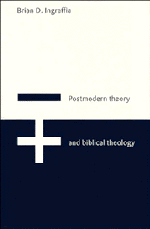Book contents
- Frontmatter
- Contents
- Acknowledgements
- List of abbreviations
- Note on translations of the Bible
- Introduction: postmodernism, ontotheology, and Christianity
- 1 NIETZSCHE'S MOCKERY: THE REJECTION OF TRANSCENDENCE
- II HEIDEGGER'S FORGETTING: THE SECULARIZATION OF BIBLICAL ANTHROPOLOGY
- III DERRIDA'S DENIALS: THE DECONSTRUCTION OF ONTOTHEOLOGY
- 11 From the ends of man to the beginnings of writing
- 12 Deconstituting the subject
- 13 Writing and metaphysics
- 14 Reading the law: the Spirit and the letter
- 15 Scripture or écriture: the limitations of Derrida's deconstruction of ontotheology
- Conclusion: ontotheology, negative theology, and the theology of the cross
- Notes
- Bibliography
- Index
15 - Scripture or écriture: the limitations of Derrida's deconstruction of ontotheology
Published online by Cambridge University Press: 01 June 2011
- Frontmatter
- Contents
- Acknowledgements
- List of abbreviations
- Note on translations of the Bible
- Introduction: postmodernism, ontotheology, and Christianity
- 1 NIETZSCHE'S MOCKERY: THE REJECTION OF TRANSCENDENCE
- II HEIDEGGER'S FORGETTING: THE SECULARIZATION OF BIBLICAL ANTHROPOLOGY
- III DERRIDA'S DENIALS: THE DECONSTRUCTION OF ONTOTHEOLOGY
- 11 From the ends of man to the beginnings of writing
- 12 Deconstituting the subject
- 13 Writing and metaphysics
- 14 Reading the law: the Spirit and the letter
- 15 Scripture or écriture: the limitations of Derrida's deconstruction of ontotheology
- Conclusion: ontotheology, negative theology, and the theology of the cross
- Notes
- Bibliography
- Index
Summary
That the logos is first imprinted and that that imprint is the writing-resource of language, signifies, to be sure, that the logos is not a creative activity, the continuous full element of the divine word, etc.
Derrida, Of GrammatologyIn the beginning was the logos, and the logos was with God, and the logos was God. He was in the beginning with God. All things came into being through Him, and without Him not even one thing came into being that has come into being.
John 1:1–4Like Nietzsche and Heidegger before him, Derrida attempts to perform a de(con) struction of the ontotheological character of metaphysics through an overcoming of the founding, metaphysical dualisms of Western thought. But none of these thinkers gives sufficient attention to an understanding of Judaeo-Christian thought before it is synthesized with Greek and modern rationalisms; therefore, when these philosophers claim to have performed a de (con)-struction of the whole of Western thought, their projects are severely limited by being blind to one of the most powerful influences on this thought. I want to demonstrate here that Derrida's deconstruction of the logocentrism of Western thought undermines only the human logos of Greek and modern rationalism, not the divine logos of biblical, Christian theology.
In an interview transcribed in Positions, Derrida describes “a kind of general strategy of deconstruction,” composed of two movements by which he deconstructs metaphysical dualisms.
- Type
- Chapter
- Information
- Postmodern Theory and Biblical TheologyVanquishing God's Shadow, pp. 213 - 224Publisher: Cambridge University PressPrint publication year: 1995



